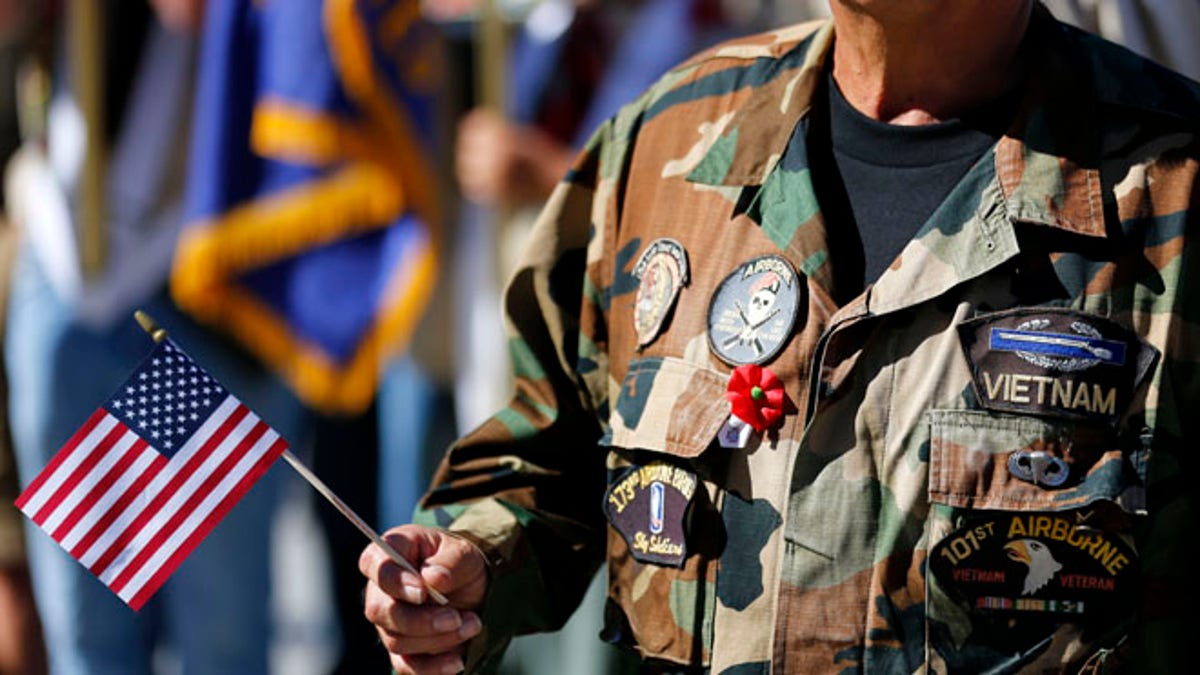
Nov. 11, 2013: A Vietnam veteran holds an American flag as he marches during the annual Veterans Day Parade in San Diego, Calif. (Reuters)
There is nothing tougher than returning home from active duty and feeling like a complete outsider. It’s the separation anxiety a veteran faces not only because of the physical and mental effects of combat, but also the lack of identity and connection to the civilian world that one must overcome to function as a member of society.
This transition from active service member to civilian becomes far easier when one is able to tie their reintegration to a commitment they made by serving in the Armed Forces: To protect the American way of life and bravely serve those around them at home and abroad. For many U.S. veterans, like myself, this pledge became a drive to continue to give back to my community through work and volunteerism.
Reintegration can be especially difficult when a veteran lacks the resources and most importantly, the health, to find and take opportunities to contribute and give back.
As a dentist in Kentucky, I often see veteran patients who are in serious need of dental work, due to many years of deprioritizing their oral health. What they don’t realize is that a lack of good oral health care can negatively affect a lot of things, including their overall health and wellbeing, view on life, self-esteem and employment opportunities. In fact, the American Dental Association (ADA) found that one in four adults with poor oral health avoid smiling and feel embarrassed – which can be particularly challenging for a veteran who may already suffer from anxiety.
It is a pleasure to meet the service men and women who are this country’s greatest patriots and help give them hope and a healthy smile.
Unfortunately, of the 21 million-plus veterans across the United States today, fewer than 10 million are enrolled for U.S. Department of Veterans Affairs (VA) health benefits, and more than 1.2 million lack health insurance altogether. What makes this situation even worse is the lack of dental benefits most veterans face since they do not receive them through the VA unless they are classified as 100 percent disabled, have a service-connected dental condition, or have a service-oriented medical condition that is affected by their mouth.
Without these benefits, veterans face barriers to basic care including cost, insurance, access, time or deep-seated emotional fears – things I see firsthand in our local Lexington veteran community. According to the ADA, only 37 percent of American adults actually visited the dentist within the last year, and veterans are more often than not, part of the 63 percent who did not.
Knowing how important oral health is for our nation’s veterans, and to make dentistry an easier part of their life, I signed on with Aspen Dental to launch the third annual Healthy Mouth Movement this year, a community giving initiative launched by Aspen Dental Management, Inc. and the dental practices it supports, to deliver free dental care and oral health education to veterans in need across the United States.
Just this past Saturday, nearly 400 Aspen Dental practices, including my own, held a national “Day of Service” where we provided free dental care to over 4,000 veterans in order to get them out of pain and in many cases, to give them a new lease on life. It is through efforts like this that makes me a proud American and an even prouder fellow veteran. It is a pleasure to meet the service men and women who are this country’s greatest patriots and help give them hope and a healthy smile.
After being deployed for an extended period of time, returning home definitely has its challenges. We, as Americans, must help give back to our veterans in order to ensure they can overcome the tough trials they face, and get back on their feet. Whether that’s through veteran employment efforts or free dental care, we can empower them to pay it forward and make a difference here at home by giving them an opportunity to just smile a little more.
